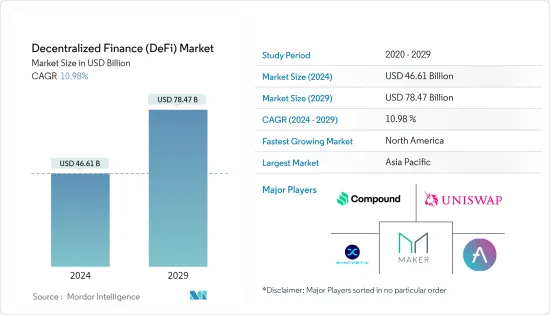PUBLISHER: Mordor Intelligence | PRODUCT CODE: 1537724

PUBLISHER: Mordor Intelligence | PRODUCT CODE: 1537724
Decentralized Finance (DeFi) - Market Share Analysis, Industry Trends & Statistics, Growth Forecasts (2024 - 2029)
The Decentralized Finance Market size is estimated at USD 46.61 billion in 2024, and is expected to reach USD 78.47 billion by 2029, growing at a CAGR of 10.98% during the forecast period (2024-2029).

The DeFi market has experienced significant growth and innovation since its inception. Total value locked (TVL) is a commonly used metric to assess the overall size and activity of the DeFi market. It represents the total value of assets locked within DeFi protocols. The term "decentralized finance" (DeFi) is a quickly expanding subset of the cryptocurrency market that uses decentralized technology like blockchain to replicate established financial services and processes. DeFi applications typically operate on public blockchains like Ethereum and utilize smart contracts to automate financial transactions and eliminate the need for intermediaries. DeFi offers various financial services, including lending and borrowing platforms, decentralized exchanges (DEXs), stablecoins, yield farming, and insurance. It enables consumers to use these services independently of conventional financial institutions, promoting greater financial inclusivity, transparency, and control over assets.
Decentralized Finance (DeFi) Market Trends
Rise in Blockchain Solutions is Fuelling the Market
Blockchain technology provides a trustless and transparent environment for financial transactions. DeFi applications can automate and enforce the rules of a transaction without the need for intermediaries by utilizing smart contracts. Blockchain technology allows for interoperability between different DeFi protocols and applications. Different DeFi platforms can seamlessly interact and integrate. This interoperability enables the composability of DeFi protocols, where developers can combine different building blocks to create new and innovative financial products. DeFi operates on public blockchains, which are accessible to anyone with an internet connection. This global accessibility enables individuals to participate in financial activities without needing a traditional bank account or credit history.
Increasing Decentralized Finance in Asia
Asia has been at the forefront of technological advancements, particularly in the blockchain and cryptocurrency space. Hong Kong, Singapore, and South Korea have established themselves as blockchain innovation and development hubs. The presence of tech-savvy populations and a supportive regulatory environment have facilitated the growth of DeFi in these regions. Many Asian countries have large unbanked or underbanked populations, where traditional financial services are inaccessible or limited. DeFi solves this problem by lending, borrowing, and investments to people who don't have access to banks. This potential for financial inclusion has driven the adoption of DeFi in Asia. DeFi protocols enable fast, low-cost, and secure cross-border transactions, providing an alternative to traditional remittance services. This has gained traction in countries like the Philippines and Vietnam, where overseas workers rely heavily on remittances.
Decentralized Finance (DeFi) Industry Overview
The Decentralized finance market, being a new market, is consolidated with few players. Some of the major players in the market include MakerDAO, Compound, Aave, Uniswap, and Synthetix, among others. In the study period, market players were also involved in mergers and acquisitions, and partnerships focused on expanding their presence in the market. The market presents opportunities for growth during the forecast period, which is expected to drive the market competition further. However, with technological advancement and product innovation, mid-size to smaller companies are increasing their market presence by securing new contracts and tapping new markets.
Additional Benefits:
- The market estimate (ME) sheet in Excel format
- 3 months of analyst support
TABLE OF CONTENTS
1 INTRODUCTION
- 1.1 Study Assumptions and Market Definition
- 1.2 Scope of the Study
2 RESEARCH METHODOLOGY
3 EXECUTIVE SUMMARY
4 MARKET DYNAMICS
- 4.1 Market Overview
- 4.2 Market Drivers
- 4.2.1 Increasing Interest in Alternative Finance Solutions
- 4.3 Market Restraints
- 4.3.1 The Potential Security Vulnerabilities and Smart Contract Risks
- 4.4 Market Opportunities
- 4.4.1 Potential for Decentralized Lending and Borrowing Platforms
- 4.5 Porters 5 Force Analysis
- 4.5.1 Threat of New Entrants
- 4.5.2 Bargaining Power of Buyers/Consumers
- 4.5.3 Bargaining Power of Suppliers
- 4.5.4 Threat of Substitute Products
- 4.5.5 Intensity of Competitive Rivalry
- 4.6 Insights on Technological Innovations in the Market
- 4.7 Impact of Covid-19 on the Market
5 MARKET SEGMENTATION
- 5.1 By Component
- 5.1.1 Blockchain Technology
- 5.1.2 Smart Contracts
- 5.2 By Application
- 5.2.1 Payments
- 5.2.2 Stablecoins
- 5.3 Geography
- 5.3.1 North America
- 5.3.1.1 US
- 5.3.1.2 Canada
- 5.3.1.3 Mexico
- 5.3.1.4 Rest of North America
- 5.3.2 Europe
- 5.3.2.1 Germany
- 5.3.2.2 UK
- 5.3.2.3 France
- 5.3.2.4 Russia
- 5.3.2.5 Spain
- 5.3.2.6 Rest of Europe
- 5.3.3 Asia Pacific
- 5.3.3.1 India
- 5.3.3.2 China
- 5.3.3.3 Japan
- 5.3.3.4 Rest of Asia Pacific
- 5.3.4 South America
- 5.3.4.1 Brazil
- 5.3.4.2 Argentina
- 5.3.4.3 Rest of South America
- 5.3.5 Middle East
- 5.3.5.1 UAE
- 5.3.5.2 Saudi Arabia
- 5.3.5.3 Rest of Middle East
- 5.3.1 North America
6 COMPETITIVE LANDSCAPE
- 6.1 Market Concentration
- 6.2 Company Profiles
- 6.2.1 MakerDAO
- 6.2.2 Compound
- 6.2.3 Aave
- 6.2.4 Uniswap
- 6.2.5 Synthetix
- 6.2.6 SushiSwap
- 6.2.7 Yearn.finance
- 6.2.8 Curve Finance
- 6.2.9 Balancer
- 6.2.10 Chainlink*
7 MARKET FUTURE TRENDS
8 DISCLAIMER AND ABOUT US




